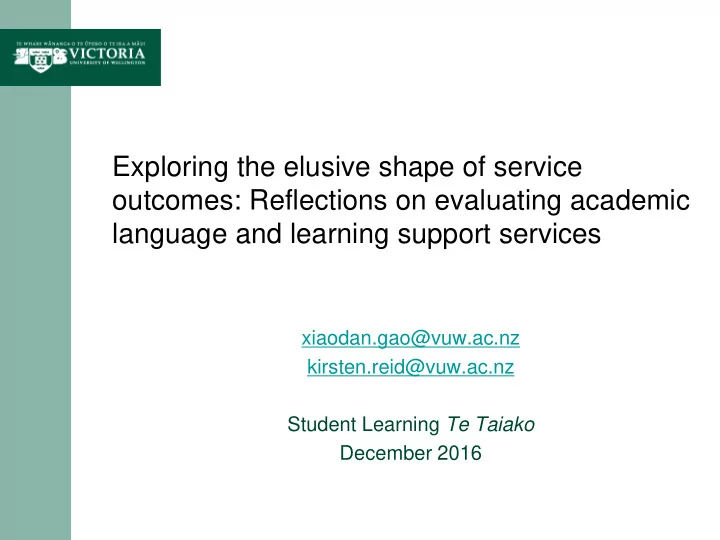

Exploring the elusive shape of service outcomes: Reflections on evaluating academic language and learning support services xiaodan.gao@vuw.ac.nz kirsten.reid@vuw.ac.nz Student Learning Te Taiako December 2016
Today’s presentation • Evaluation in Higher Education • Evaluation in student services contexts • Student Learning Te Taiako – a case study • Interactive activity • Towards developing an evaluation framework • The next step
Evaluation in Higher Education (HE) 1) HE institutions are under increasing pressure to demonstrate tangible evidence of their performance . ( Suskie 2006; Lomas 2007;Duque 2013; Franco-Santos, Rivera & Bourne 2014; Chalmers & Hunt 2016; Alach, 2015). 2) Purpose of outcome evaluation can be unclear (Harvey & Newton 2004) 3) Outcome evaluation can reflect a “clash of cultures” and is a ‘game’ leading to “tokenism, reputation management and image control ” (Chalmers & Hunt (2016: 27)
Evaluation in Higher Education (HE) 4) Institutions can build quality frameworks, and systematic evaluation can lead to an improvement in education quality and student outcomes or achievement. (Tucker, Pegden & Yorke 2012)
Evaluation in academic learning advising contexts 1) It is difficult to establish connection between learning advising and academic outcomes 2) Need to build “culture of evaluation” (McCann & Sato, presentation at AALL Symposium 2014) 3) Need to take control of evaluation (Hilsdon, presentation at AALL Symposium 2014) 4) Good evaluation adds to professionalism (Macdonald, 2006)
Student Learning Te Taiako • One-to-one appointments • Study skills workshops • Maths & Stats support • Workshops for international students • Postgraduate seminars • Peer Assisted Study Support (PASS) • Cross-cultural communication programme • Conversation class • Support for Refugee Background students • Grammar workshops • Resources • Orientation programmes • Faculty requested workshops • Staff training
An evaluation project at SL • The original evaluation project ( See Reid & Gao 2015) - one-to-one consultations - peer observation - triangulated with student feedback and self reflections • Question – how can we evaluate impact?
Reflection What does evaluation look like in your institution?
Towards developing a framework • A good framework needs to be based on guiding theory of academic advising practices • Evaluation needs to use research based criteria (Prebble, Hargraves, Leach, Naidoo, Suddaby & Zepke 2005: 53-54) • Evaluation should start with clear mission statement (Cuseo,n.d.) • Service objectives should link to wider institutional goals
Towards developing a framework • Evaluation should be a regular part of best practice • A comprehensive set of evaluation tools is required – multiple methods of data collection – views of all stakeholders included – voices of students who do not respond to surveys (Tucker, Pegden & Yorke 2012) – or who do not use the service
Towards developing a framework • Evaluation should reflect contribution to both social and academic aspects of student experience
Summary SL plans to create a framework for future evaluation practice which • is based on research and theory • aligns SL objectives to institutional strategies and student experience indicators • links objectives of individual programmes to SL objectives • sets clear evaluation guidelines that stipulate frequency of evaluation • defines tools that collect both quantitative and qualitative data from all stakeholders • specifies how evaluation results should be distributed.
References Alach, Z. (2015), ‘Performance measurement and accountability in higher education: the puzzle of qualification completions’, Tertiary Education and Management , 22:1, pp.36-48. Chalmers, D. and Hunt, L. (2016), ‘Evaluation of teaching’, HERDSA Review of Higher Education , 3, pp.25-55. Cuseo, J. (n.d.), ‘Assessment of academic advisors and academic advising’, https://www.nacada.ksu.edu/Portals/0/CandIGDivision/documents/assessment%20of%20advising%20resources/Cuseo_M arymount1.pdf. Accessed 3 September 2016. Duque, L. (2013), A Framework for Analysing Performance in Higher Education . Madrid: Universidad Carlos 111 de Madrid. Franco-Santos, M., Rivera, P., and Bourne, M. (2014), Performance Management in UK Higher Education Institutions: The Need for a Hybrid Approach , London: Leadership Foundation for Higher Education. Harvey, L. and Newton, J. (2004), ‘Transforming quality evaluation’, Quality in Higher Education , 10:2, pp.149-165. Lomas, L. (2007), ‘Are students customers? Perceptions of academic staff’, Quality in Higher Education , 13:1, pp.31-44. Macdonald, R. (2006), ‘The use of evaluation to improve practice in learning and teaching’, Innovations in Education and Teaching International , 43:1, pp.3-13. Prebble, T., Hargraves, H., Leach, L., Naidoo, K., Suddaby, G. and Zepke, N. (2005), Impact of Student Support Services and Academic Development Programmes on Student Outcomes in Undergraduate Tertiary Study: A Synthesis of the Research , Wellington: Ministry of Education. Reid, K. and Gao, X. (2015), ‘What we do in the shadows: Evaluating the one - to one tertiary learning advice consultation’, The Association of Tertiary Learning Advisors Aotearoa/New Zealand (ATLAANZ), 1, http://journal.atlaanz.org/index.php/ATLAANZ/article/view/3. Accessed 3 September 2016. Tucker, B., Pegden, J- A., and York, J. (2012), ‘Outcomes and evaluations: Is there a relationship between indicators of student success and student evaluations of learning?’, in N. Brown, S.M. Jones, and A. Adam. (eds), Research and Development in Higher Education: Connections in Higher Education , Hobart, Australia, 2-5 July 2012, pp.326-339.
Recommend
More recommend